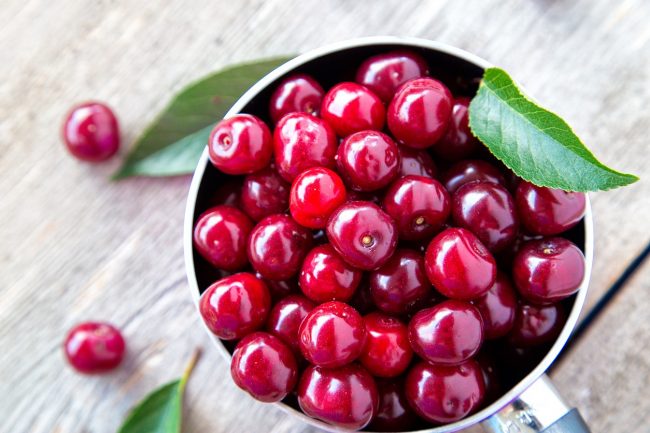Usually, cherries only get the spotlight on your healthy summer shopping list. But there are plenty of reasons to enjoy this superfood all year round. While there’s no true definition of a “superfood,” the health benefits of cherries are more than enough to qualify as “super.” Tart cherries, specifically, have been widely studied for their influence on muscle soreness recovery and inflammation. And as any avid exerciser knows, inflammation doesn’t have an off season.
The health benefits of cherries
Whether sweet or tart, all cherries are a good source of vitamin C, fiber, carotenoids and polyphenols. Tart cherries, specifically, are loaded with vitamin C and polyphenols. In fact, tart cherries have a higher concentration of anthocyanins (a family of polyphenols) than sweet cherries and other fruits. These nutrients have anti-inflammatory and antioxidant properties, which can protect against oxidative stress put on the body during extreme forms of exercise.
According to a 2018 review of published reports, there is “reasonably strong” evidence of the health benefits of cherries. The review says, “consumption of cherries decreased markers for oxidative stress, inflammation, exercise-induced muscle soreness and loss of strength.”
The majority of studies on tart cherries focus on these health benefits as they relate to endurance activity. During endurance exercise, free radicals are produced. If you don’t have a strong antioxidant defense, these free radicals can lead to increased oxidative stress. Oxidative stress can then lead to damaged cells and prolonged recovery time.
But cherry juice may be able to help with that recovery time. In the Journal of the International Society of Sports Nutrition, a 2010 study concluded that consuming tart cherry juice for seven days before and during a “strenuous running event” minimized post-run muscle pain.
A 2016 study in the same journal revealed the health benefits of tart cherries can also influence an athlete’s race times. Supplementation of Montmorency tart cherries “reduced immune and inflammatory stress” and even “increased performance in aerobically trained individuals.” Study participants actually averaged 13 percent faster half-marathon times compared to the placebo group.
The cherry on top
Tart cherries contain a small amount of melatonin. Melatonin is the sleep-regulating hormone released by the pineal gland once the sun sets. Unfortunately, melatonin benefits decrease with age, as your body’s ability to produce it diminishes. So in 2010, the Journal of Medicinal Food published a study examining the effects of tart cherry juice on sleep behavior in older adults. While further research is warranted, the study did find that tart cherry juice supplementation had “modest beneficial effects on sleep in older adults with insomnia.”
There have even been a few studies exploring how tart cherry supplementation affects the cognitive function and aging. (Note: to date, these studies have only been performed on rats.) In 2016, researchers from the Netherlands evaluated 30 aged rats to determine the health benefits of cherries on memory and motor performance. Tart cherry supplementation proved to improve working memory, hippocampal inflammation and autophagy function (the ability to clear out cellular debris).
The best way to enjoy tart cherries
To see the greatest performance results, athletes should drink eight to 12 ounces of tart cherry juice twice daily, ideally seven days before a race, the day of your race and 48 hours after the event.
For non-competitive athletes who are simply interested in the anti-inflammatory properties of tart cherries, try this tonic: fill an eight-ounce glass with one or two ounces of tart cherry juice concentrate and the rest with water. The water will dilute the tartness while keeping you hydrated and healthy.
If you prefer to chew your cherries, dried tart cherries are always an easy grab-and-go option. You can also turn them into a slow-cooker oatmeal breakfast for something more substantial.
However you choose to enjoy tart cherries, this superfood can be play a key role in achieving optimal health and peak performance.

